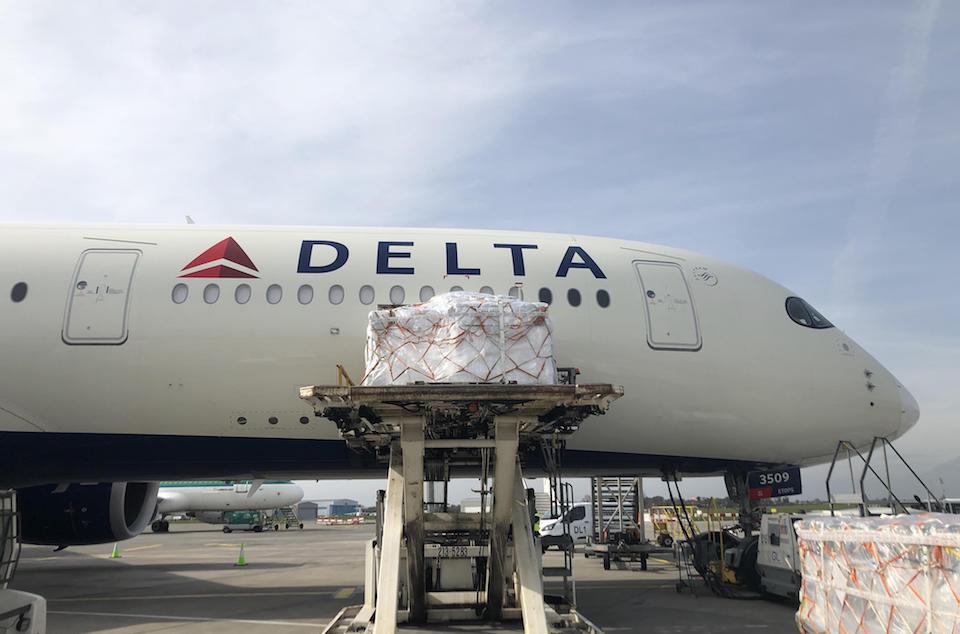U.S. Sees Airline Loyalty Assets as Possible Collateral
The U.S. Treasury Department is in talks with some airlines about accepting their loyalty programs as collateral against government loans to help them weather the coronavirus crisis.
Other assets are also in play, including some international flight routes, planes, engines, airport gates and spare parts, according to people familiar with the negotiations, who requested anonymity because the matter is private. Applications are due Friday for the $25 billion loan program, the second round of U.S. funds made available to airlines. The people didn’t name the airlines.

Airlines are among the industries hardest hit by the spread of the coronavirus and related government restrictions on travel. Passenger traffic in the U.S. has dropped to 5% of what it was a year earlier, and carriers have slashed flying capacity by as much as 90%.
The Treasury already has doled out a separate $25 billion in cash assistance and loans to help airlines pay employees. American Airlines Group Inc. Chief Executive Officer Doug Parker said Tuesday that his carrier would seek a $4.75 billion loan from the Treasury. Other carriers have declined to comment on plans to seek loans.
A Treasury spokeswoman declined to comment.
American, Delta Air Lines Inc. and United Airlines Holdings Inc. have the largest loyalty programs.
Airlines disclose very few financial details of their loyalty programs, including their primary source of revenue—selling miles to banks that then use them to reward customer credit card use. Delta last year received total cash proceeds of $4.2 billion from such sales, including $4 billion from American Express, its card issuer, according to Joe DeNardi, a Stifel analyst.
DeNardi pegged the Delta, United and American loyalty program valuations at $21.6 billion, $19.5 billion and $12.5 billion respectively, according to an April 1 research note. He estimated Southwest Airlines Co., Alaska Air Group Inc. and JetBlue Airways Corp.’s mileage plans as being worth $10.6 billion, $4.4 billion and $2.1 billion, respectively.
There is concern that if travel demand doesn’t rebound, airlines will have very few unencumbered assets left, and that would restrict the availability of collateral for later financing down the road, one of the people said.
Airlines already have tapped banks for billions in new debt. They have parked thousands of aircraft, consolidated facilities, frozen hiring and delayed capital projects. At least 87,000 employees have taken leaves, early retirement or reduced work hours at the three largest carriers alone.
The value of airline loyalty programs has swelled as firms including American Express Co. and JPMorgan Chase & Co. agreed to credit-card deals that came with the promise of the lenders purchasing billions of dollars in miles each year.
Airlines have yet to execute deals similar to the one Hilton Worldwide Holdings Inc. reached with AmEx on Thursday. The hotel chain agreed to pre-sell $1 billion worth of points tied to its loyalty program to raise cash.
Similar Stories
JAS Worldwide signs SPA with International Airfreight Associates B.V.
JAS Worldwide, a global leader in logistics and supply chain solutions, and International Airfreight Associates (IAA) B.V., a prominent provider of comprehensive Air and Ocean freight services headquartered in the…
View Article
LATAM is once again part of the Dow Jones Sustainability Index
View Article
CPaT partners with Wizz Air, Europe’s leading ultra-low-cost airline, to enhance aviation training
View Article
Air Transat takes off to Tulum from Montreal and Quebec City
View Article
Air France KLM Martinair Cargo achieves record online sales and accelerates commercial transformation
View Article[Freightos Weekly Update] Frontloading continues to put pressure on transpacific rates
Transpacific ocean rates increased slightly last week and are about 15% higher than at the start of December as frontloading ahead of expected tariffs is keeping vessels full.
View ArticleGet the most up-to-date trending news!
SubscribeIndustry updates and weekly newsletter direct to your inbox!





